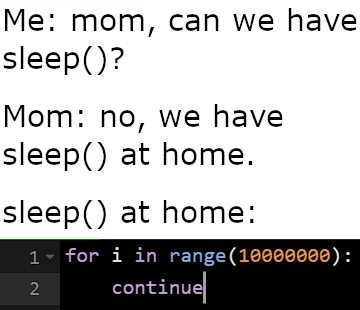Ah yes. The speedup-loop.
https://thedailywtf.com/articles/The-Speedup-Loop
Programmer Humor
Welcome to Programmer Humor!
This is a place where you can post jokes, memes, humor, etc. related to programming!
For sharing awful code theres also Programming Horror.
Rules
- Keep content in english
- No advertisements
- Posts must be related to programming or programmer topics
This is brilliant.
I think some compilers will just drop that in the optimization step.
Real pain in the ass when you're in embedded and your carefully placed NOPs get stripped
asm("nop");
Homer: "oh yeah speed ~~holes~~ sleep"
Sleep holes
Tell the CPU to wait for you?
Na, keep the CPU busy with useless crap till you need it.
Fuck those other processes. I want to hear that fan.
I paid good money for my fan, I want to know it's working!
Have you considered a career in middle management
On microcontrollers that might be a valid approach.
I've written these cycle-perfect sleep loops before.
It gets really complicated if you want to account for time spent in interrupt handlers.
Thankfully I didn't need high precision realtime. I just needed to wait a few seconds for serial comm.
But then I gotta buy a space heater too...
Microcontrollers run 100% of the time even while sleeping.
Nah, some MCUs have low power modes.
ESP32 has 5 of them, from disabling fancy features, throttling the clock, even delegating to an ultra low power coprocessor, or just going to sleep until a pin wakes it up again. It can go from 240mA to 150uA and still process things, or sleep for only 5uA.
Nah, Sleeping != Low power mode. The now obsolete ATmega328 has a low power mode.
This should be the new isEven()/isOdd(). Calculate the speed of the CPU and use that to determine how long it might take to achieve a 'sleep' of a required time.
I took an embedded hardware class where specifically we were required to manually calculate our sleeps or use interrupts and timers rather than using a library function to do it for us.
Javascript enters chat:
await new Promise(r => setTimeout(r, 2000));
Which is somehow even worse.
As someone who likes to use the CPU, I don't think it's worse.
I mean, it’s certainly better than pre-2015.
I actually remember the teacher having us do this in high school. I tried it again a few years later and it didn't really work anymore.
On my first programming lesson, we were taught that 1 second sleep was for i = 1 to 1000 😀, computers was not that fast back then...
I mean maybe in an early interpreted language like BASIC… even the Intel 8086 could count to 1000 in a fraction of a second
This was in 1985, on a ABC80, a Swedish computer with a 3 MHz CPU. So, in theory it would be much faster, but I assume there were many performance losses (slow basic interpretor and thing like that) so that for loop got close enough to a second for us to use.
You gotta measure the latency of the first loop.
I can relate. We have breaks ate work too.
I just measured it, and this takes 0.17 seconds. And it's really reliable, I added another zero to that number and it was 1.7 seconds
Sudo sleep
